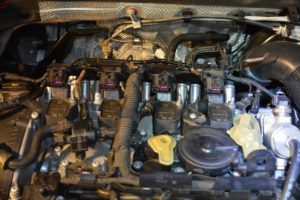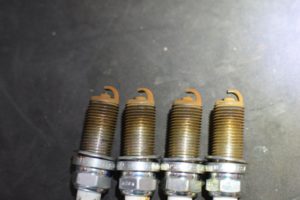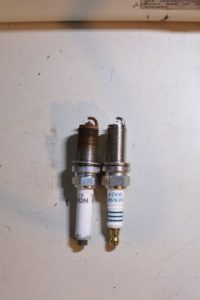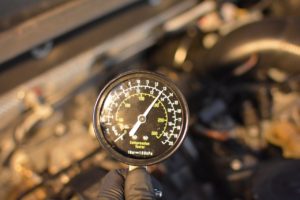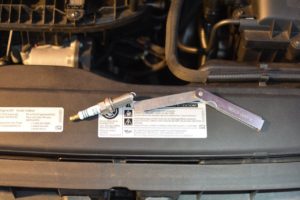When turning up the power on a vehicle such as we are doing via the COBB Accessport, inevitably more heat is generated. With more heat in the combustion chamber, you may start to move outside the optimal heat range of the OEM plugs and thus have an increased risk of pre-ignition. For more in-depth spark plug tech check out our spark plug article here. Because of this our red development MK7 GTI is getting a fresh set of plugs.
Knock, Pre-Ignition and Heat Range
Do not confuse pre-ignition and detonation (or knock). Knock is what the knock sensor picks up and you can datalog this as ignition corrections during a pull. Knock is caused by multiple flame fronts starting AFTER the initial flame front was started by the spark plug. Replacing the spark plugs with a step colder will not prevent knock – knock is a result of fuel used, tune, and temperatures – and I mention this because we get asked all the time if replacing the plugs will reduce knock. It will not. However it will reduce the CHANCE for pre-ignition and pre-ignition is much more serious than knock and more damaging should it occur. The knock sensors can’t pick up pre-ignition because pre-ignition happens when the air-fuel mixtures ignites BEFORE the spark event and will usually result in a hole in a piston or broken rod. A colder spark plug helps this because it pulls more heat into the head of the engine from the combustion chamber and is less likely to act as a point of ignition before it is triggered by the ECU.
Generally speaking when starting to tune a car, we go for a step colder plug than factory to avoid pre-ignition. Going too cold can prevent the plug getting hot enough to burn off deposits in daily driving and can result in fouling and misfire – so a compromise must be struck for a street car. For the MK7 GTI we chose the popular Denso IKH24KT. The Install
The Install
Installing the spark plugs is fairly straightforward. You will need to remove the engine cover, the coil pack harness, and then pull each individual coil pack.

Once the spark plugs have been pulled it’s a good time to give them a look-over. Our plugs were very clean with no speckles or excessive deposits. They were burning cleanly without obvious evidence or oil consumption or knock. The orange deposit is due to running some race fuel additive (and normal if doing so). You can see that the new step colder plugs have a slightly recessed tip which is a feature of colder plugs.
Compression Test (while the plugs are out)
If you have a compression tester handy, this is a great time to perform a quick compression test of your GTI. Very little is required to do so. You simply plug the compression tester in each spark plug hole and crank the engine while holding the accelerator pedal to the floor. I crank until the compression tester needle stops rising and this is around 12-15 cranks per cylinder.
What you are looking for in terms of the compression test results is consistency across all the cylinders. The absolute number will depend on the tester used and altitude above sea level. Our development vehicle was very healthy with a 190psi reading across all four cylinders.
Before putting the new spark plugs in and torquing them down to 18-20ft/lb it is worth checking their gap using a feeler gauge. We recommend 0.024-0.026″ (0.60-0.66mm) to prevent misfiring under heavy load. The gap will naturally open up over time as they wear out and heat cycle. The new Densos did not require any adjustment of the gap.
Once the plugs are back in along with the coil packs and harness, you’re done! You’ve now checked the health of your motor with a quick compression test, looked at how clean it is running via inspecting the old plugs, and freshened up the ignition system with new plugs that are more tolerant to tuned, higher performance driving.
The Stratified Team


